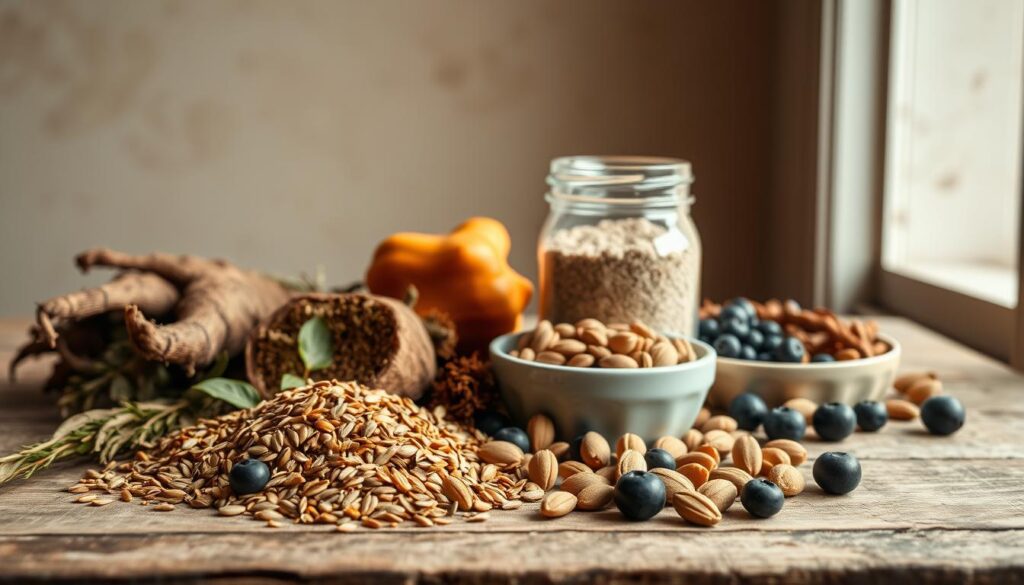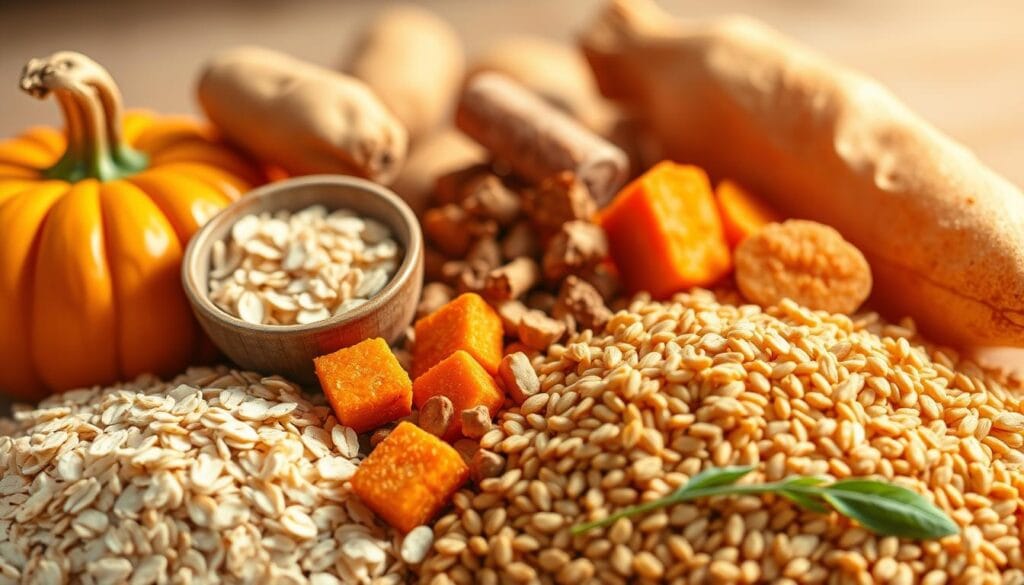Table of Contents
Every dog owner knows that moment of pure joy when their furry companion looks healthy and vibrant. As a passionate pet parent, I’ve learned that the secret to my dog’s wellness lies in understanding the power of dietary fiber for dogs. Fiber isn’t just a buzzword—it’s a critical component of canine nutrition that can transform your dog’s digestive health from the inside out.
When I first discovered the incredible benefits of fiber for dogs, it was like unlocking a hidden key to optimal pet wellness. Dietary fiber for dogs isn’t just about keeping things moving smoothly—it’s about supporting their entire digestive ecosystem. From maintaining a healthy weight to preventing uncomfortable digestive issues, fiber plays a crucial role in your dog’s overall health.
This journey into understanding fiber for dogs is more than just nutritional advice—it’s about giving your beloved companion the best possible quality of life. Whether you have a playful puppy or a wise senior dog, the right fiber intake can make a world of difference.
Key Takeaways
- Fiber is essential for optimal canine digestive health
- Different types of fiber support various aspects of dog nutrition
- Proper fiber intake can help manage weight and prevent digestive issues
- Natural fiber sources can be easily incorporated into your dog’s diet
- Consulting with a veterinarian is crucial when adjusting dietary fiber for dogs
Understanding the Role of Fiber in Canine Nutrition
Dietary fiber is key for a dog’s digestive health. Dogs, like humans, need a balanced diet with the right fiber. Knowing the benefits of fiber helps you choose the best food for your dog.
Types of Dietary Fiber for Dogs
Dogs need two main types of fiber:
- Soluble Fiber: It dissolves in water and helps control blood sugar.
- Insoluble Fiber: It makes stool bulkier and helps with regular bowel movements.
How Fiber Supports Digestive Health
Fiber does more than just help with digestion. It keeps the gut healthy by:
- Encouraging good bacteria growth
- Lowering inflammation in the digestive tract
- Helping with weight control
- Keeping blood sugar stable
The Science Behind Fiber Absorption
Dogs digest fiber differently than humans. Their bodies ferment fiber in the large intestine. This creates energy and supports gut health. Veterinarians suggest the right amount of fiber for best digestion.
Proper fiber intake can significantly improve your dog’s digestive wellness and quality of life.
Benefits of Incorporating Fibre for Dogs
Fiber is key for your dog’s health, offering more than just digestion benefits. Knowing the fiber benefits for dogs helps you choose the best food for them.
Fiber gives dogs several important health benefits:
- Weight Management: Fiber makes dogs feel full, helping them eat less and stay at a healthy weight
- Digestive Regulation: It helps keep bowel movements regular and prevents constipation
- Blood Sugar Control: It helps keep blood sugar levels stable, which is good for dogs with diabetes
- Gut Microbiome Support: It helps grow good bacteria in the digestive system
Veterinary nutritionists say fiber is a game-changer for your dog’s digestive health. It improves stool quality, reduces anal gland problems, and helps absorb nutrients better.
“Fiber is not just a dietary filler, but a powerful nutritional tool for canine wellness.” – Dr. Karen Becker, Veterinary Nutritionist
Dogs with health issues like obesity, diabetes, or sensitive stomachs benefit from fiber. By knowing your dog’s nutritional needs, you can improve their health and energy.
Essential Sources of Natural Fiber for Your Dog
Learning about the best fiber sources for dogs can greatly benefit their digestive health. There are many wholesome foods that can be added to their diet. Knowing these sources helps you make better choices for your pet’s nutrition.
Dogs need a balanced diet with essential nutrients, and fiber is key for their digestive system. The right fiber sources help with bowel movements, weight management, and gut health.
Vegetable-Based Fiber Options
Vegetables are some of the best natural fiber sources for dogs. Here are some dog-friendly options:
- Pumpkin: A top choice packed with nutrients
- Green beans: Low-calorie and high in fiber
- Sweet potatoes: Nutrient-dense and easily digestible
- Carrots: Crunchy and rich in vitamins
Fruit Fiber Sources
Some fruits are great fiber sources for dogs when given in moderation:
- Apples (without seeds): Great fiber content
- Blueberries: Antioxidant-rich and fibrous
- Bananas: Soft and easy to digest
Grain-Based Fiber Alternatives
Certain grains can add more fiber to your dog’s diet:
- Brown rice: Easily digestible whole grain
- Oatmeal: Gentle on the digestive system
- Quinoa: Protein-rich and fiber-packed
Pro tip: Always introduce new foods gradually and in small quantities to prevent digestive upset. Consult with your veterinarian before making significant changes to your dog’s diet.
Signs Your Dog Needs More Fiber
Knowing when your dog needs more fiber is key for their digestive health. As dogs get older, their diet needs change. Adding more fiber is important.
Look out for these signs that your dog might need more fiber:
- Irregular or inconsistent bowel movements
- Frequent constipation or hard stools
- Excessive gas or bloating
- Frequent scooting across the floor
- Unexplained weight gain
Senior dogs need special care when it comes to fiber. Nutritional needs change with age. Commercial dog foods might not always have the right amount of fiber. This can cause digestive issues and health problems.
Keep an eye on your dog’s digestion. If they have ongoing digestive problems, talk to your vet. They can suggest the right amount of fiber and recommend good sources for your dog.
A balanced diet is key to your dog’s overall health and well-being.
Some dogs need more fiber because of health issues like diabetes or weight problems. Spotting these signs early helps you make better food choices for your dog.
Safe Ways to Add Fiber to Your Dog’s Diet
Adding fiber to your dog’s diet can greatly improve their digestive health. Veterinarians suggest introducing high fiber dog food slowly. This ensures your dog gets the nutrients they need without upsetting their stomach.
Adding fiber the right way is important. Your dog’s size, breed, and health status affect how much fiber they need.
Portion Guidelines by Dog Size
Dogs of different sizes need different amounts of fiber:
- Small dogs (under 20 lbs): 1-2 tablespoons of fiber per meal
- Medium dogs (20-50 lbs): 2-3 tablespoons of fiber per meal
- Large dogs (50+ lbs): Up to 1/4 cup of fiber per meal
Gradual Introduction Methods
Start with small amounts of fiber to avoid upset stomachs. Increase the amount over 1-2 weeks. Keep an eye on how your dog reacts and adjust as needed.
“Patience is key when changing your dog’s diet. Slow and steady wins the nutritional race.” – Veterinary Nutrition Expert
Mixing Tips and Techniques
Make high fiber dog food more appealing by:
- Mixing fiber sources with regular food
- Using pureed vegetables
- Incorporating fiber-rich supplements
- Rotating fiber sources to maintain interest
Always consult your veterinarian before making significant dietary changes to ensure your dog’s specific nutritional needs are met.
Potential Risks and Side Effects of Excess Fiber

Fibre for dogs is very good, but too much can be bad. Your dog’s stomach needs just the right amount. Too much fiber can cause problems.
Dogs with too much fiber might face several issues:
- Persistent gas and bloating
- Unexpected diarrhea
- Reduced nutrient absorption
- Potential weight loss
“Moderation is key when introducing dog fiber supplements to your pet’s diet.” – Veterinary Nutrition Experts
It’s important to know when your dog has too much fiber. Look for signs like:
- Sudden changes in stool consistency
- Increased flatulence
- Discomfort after meals
Vets say to add fiber slowly. Start with a little and watch how your dog reacts. Every dog is different, so what works for one might not work for another.
If your dog has ongoing digestive problems, see your vet right away. They can adjust the fiber and make sure your dog stays healthy without discomfort.
Commercial High-Fiber Dog Food Options
Choosing the right high fiber dog food is key to your dog’s digestive health. Today, many commercial dog foods are packed with fiber. This helps meet your pet’s nutritional needs.
When picking high fiber dog food, look for brands with natural fiber sources. These often include:
- Whole grains like brown rice
- Vegetables such as sweet potatoes
- Beet pulp
- Pumpkin
- Legume-based ingredients
Dog fiber supplements can also help. They come in special formulas for different digestive needs.
| Brand | Fiber Content | Primary Ingredients |
|---|---|---|
| Royal Canin Digest Sensitive | 4.5% | Rice, chicory root |
| Hill’s Science Diet Sensitive Stomach | 3.8% | Brewers rice, beet pulp |
| Purina Pro Plan Focus | 4.2% | Whole grain wheat, rice bran |
Always talk to your vet before changing your dog’s food. They can suggest the best high fiber dog food for your pet’s health and age.
Pro tip: Gradually introduce new high fiber dog food to prevent digestive upset.
Remember, every dog is unique. What works for one might not work for another. It’s important to watch how your dog reacts to new foods and supplements.
Natural Fiber Supplements for Dogs
Improving your dog’s digestive health can be a big change with natural fiber. Many whole foods offer great nutritional benefits for your pet’s wellness. This means you don’t always need processed products for fiber supplements.

Looking into natural fiber sources can add essential nutrients to your dog’s diet. It also keeps their meals interesting and healthy. Let’s explore some powerful plant-based options that can help your dog’s digestive system.
Pumpkin Power for Canine Nutrition
Pumpkin is a top natural fiber supplement for dogs. It’s full of nutrients and easy to digest. This vibrant orange vegetable offers many health benefits:
- Supports healthy digestion
- Helps regulate bowel movements
- Contains essential vitamins and minerals
- Low in calories
Sweet Potato Superfood
Sweet potatoes are also great for dogs. They’re packed with nutrients and offer:
- Complex carbohydrates
- High fiber content
- Beta-carotene for eye health
- Digestive system support
Green Beans and Carrots: Crunchy Fiber Options
Green beans and carrots are perfect for dogs who love a crunchy snack. They’re great fiber supplements and offer:
- Low-calorie fiber intake
- Nutritional variety
- Natural chewing satisfaction
- Additional vitamins and minerals
Pro tip: Always introduce new foods gradually and consult your veterinarian to ensure they suit your dog’s specific dietary needs.
Foods to Avoid When Increasing Fiber Intake
When adding fibre for dogs to their diet, not all foods are safe or beneficial. Some foods that seem healthy can actually harm your dog’s digestive system. It’s important to know which foods to avoid to keep your pet healthy.
Certain foods can mess with your dog’s fiber intake and cause serious health issues. Dogs need a diet that’s different from humans.
- Avoid canned vegetables with high sodium content
- Steer clear of fruits with seeds or pits
- Eliminate foods with artificial sweeteners
- Remove high-sugar processed foods
When looking for the best fiber sources for dogs, be careful with some vegetables and fruits. Canned green beans, for example, have too much salt and can harm your dog’s health.
| Food Category | Potential Risks | Recommended Action |
|---|---|---|
| Canned Vegetables | High sodium content | Choose fresh or frozen alternatives |
| Fruits with Seeds | Choking hazard, potential toxicity | Remove seeds and pits completely |
| Processed Foods | Artificial additives | Select natural, whole food options |
Pro tip: Always talk to your vet before changing your dog’s diet. They can help you add fiber safely and effectively.
When increasing fiber intake, focus on natural, dog-friendly sources. These support digestive health without risks.
Conclusion
Knowing how fiber helps dogs is key for their health. Fiber does more than just feed them; it helps with weight, digestion, and overall health. Choosing the right fiber sources is important for your dog’s well-being.
Dogs have different needs based on their age, breed, and health. Fiber is great, but adding new foods slowly is important. Some dogs need more fiber than others, so a custom diet is best.
Getting help from a vet is the best way to change your dog’s diet. Vets can give advice based on your dog’s health. They ensure the right amount of fiber for your dog’s health without upsetting their stomach.
A good diet is about more than fiber. By focusing on your dog’s needs and working with vets, you can keep them healthy and happy. Making smart food choices is important for their long-term health.
There are no reviews yet. Be the first one to write one.

